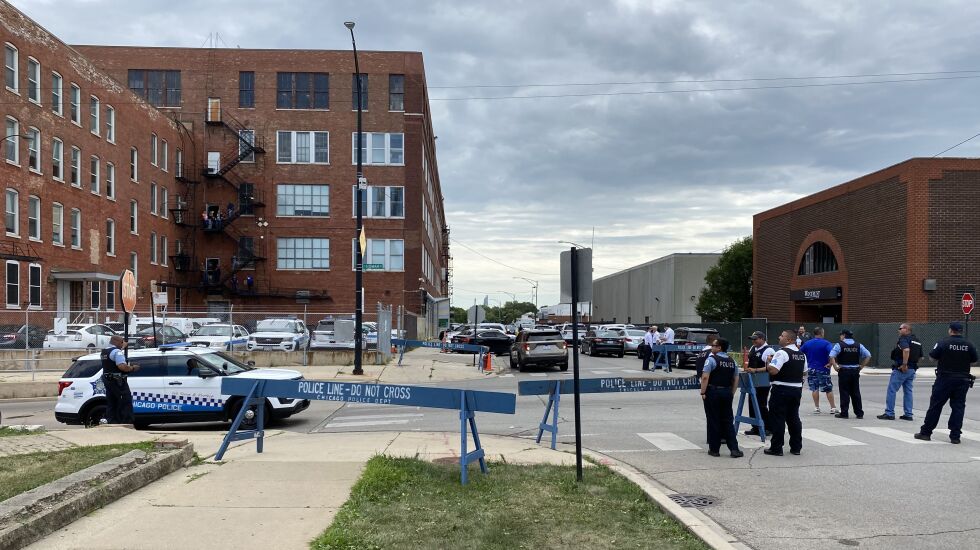
Ald. Anthony Napolitano, a former Chicago police officer, wants to explore the use of “alternate treatments” to reverse an epidemic of police suicides that has seen eighteen CPD officers take their own lives since September 2019.
The resolution championed by the Napolitano and co-signed by more than two dozen of his colleagues calls for three City Council committees — Budget, Public Safety and Health and Human Relations — to hold a joint hearing to discuss at least two costly treatments for suicide prevention and treatment of Post-Traumatic Stress Disorder not now covered by city insurance.
The resolution specifically mentions “stellate ganglion block” and Ketamine treatments. Both types of injections have been used effectively to treat U.S. soldiers at risk of committing suicide.
Napolitano noted that a stellate ganglion block, known to recipients as a “God Shot,” delivered amazing results to one of the commanding officers on the scene the night Officer Ella French was fatally shot and her partner, Carlos Yanez Jr. was critically wounded after pulling over an SUV with expired plates.
That officer, however, was forced to pay for the pair of neck injections out of his own pocket because it wasn’t covered by city insurance. The treatment local anesthetic sometimes known as the “Dual Sympathetic Reset” can bring the “fight-or-flight response back to its pre-trauma state,” Napolitano’s resolution states.
“In people who suffer post-traumatic stress from their jobs, these are the situations that cause a person to feel like they have, maybe, a suicidal urge or a feeling [of hopelessness that can lead to] suicide,” said Napolitano, who represents the Northwest Side’s 41st Ward.
“It’s a tool that has worked in the military. We have Chicago police officers who are using it and it has completely changed their lives. ... After this treatment, [suicide is] not even a thought anymore. Everything has changed. They call it a reset for your thinking process and a reset for the way you evaluate your own life based on the trauma you’ve been through.”
Napolitano pegged the cost of the two neck injections at roughly $2,000. There are “almost zero” side effects, with the exception of a “temporary droop” in the eye on the side where the injection is administered, he said.
“It’s not completely FDA-certified yet, so your insurance is not going to acknowledge it unless we ask them to acknowledge it and have it as a treatment,” the alderperson said.
“And [even if it’s covered], insurance is going to be red tape. Everything with bureaucracy attached to it is gonna be red tape. So, we’re seeing, can we roll this into our Flex Pay system. We’re still paying for it ourselves, but it comes out of Flex Pay so you can pay for the treatment up front, then pay that back by them taking it out of your check over the next twelve months.”
Mark Doyle is the founder of Rags of Honor One, a non-profit that has spent the last four years raising money for and building awareness of stellate ganglion block injections for hundreds of soldiers and police officers across the nation. His non-profit has bankrolled those injections for 10 CPD officers.
“The procedure helps to reset the ganglion cluster of nerves that becomes over-active when you’ve been under extreme amounts of stress and trauma, causing anxiety, sleeplessness, ideations of suicide,” Doyle said, adding that “88% of the time, one procedure [or two injections] and the patient is sleeping, back to work. We get quotes from several people like, ‘My children love me again. I can sleep again.’ It’s really quite miraculous.”
Alexa James, CEO of the National Alliance on Mental Illness Chicago, acknowledged the alternative treatment medication is “incredibly effective” in reducing post-traumatic stress, which can trigger the feeling of hopelessness than sometimes devolves into suicide.
“We refer out for the ganglion block and Ketamine all the time and see tremendous response,” James said.
“In some emergency departments in other parts of the country, they actually use Ketamine treatment for folks who are coming in who are suicidal. It’s like a very fast-acting brain healer, with very little side effects, if any. I’ve done Ketamine treatment for my depression, actually. It’s incredible.”
But James said alternative treatments are only part of the solution. The city also needs to make sure its health insurance plans have an adequate number of clinicians and cover the broad swath of mental health services.
“Current health insurance makes it challenging to seek mental health services consistently because, for example, the current health insurance will not reimburse couples counseling,” James said.
“Because we have a workforce shortage to begin with, we receive calls consistently that it is difficult to find therapists within the network for police officers. The reimbursement rates … were actually decreased in the last several years. So clinicians are unable to afford to treat particular insurance coverage. One of those happens to be [the city’s] Blue Choice.”







